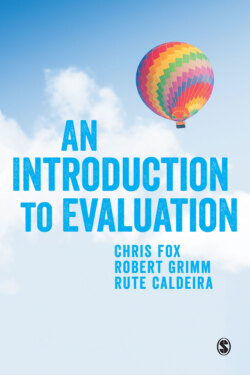Читать книгу An Introduction to Evaluation - Chris Fox - Страница 43
На сайте Литреса книга снята с продажи.
Ethical guidelines
ОглавлениеThere are many professional societies and associations for evaluators, some organised on national lines and some on subject or sector lines. Many of these have published guidelines on ethical evaluation.
For example, the American Evaluation Association’s Guiding Principles for Evaluators sets out five principles. The headline principles are as follows:
Systematic Inquiry Evaluators conduct systematic, data-based inquiries
Competence Evaluators provide a competent performance for stakeholders
Integrity/Honesty Evaluators display honesty and integrity in their own behaviour, and attempt to ensure the honesty and integrity of the entire evaluation process
Respect for People Evaluators respect the security, dignity and self-worth of respondents, programme participants, clients, and other evaluation stakeholders
Responsibilities for General and Public Welfare Evaluators articulate and take into account the diversity of general and public interests and values that may be related to the evaluation
Each headline is then elaborated on by the Association. It is beyond the scope of this book to survey the many guidelines that associations and societies have produced in detail. Simon (2006) suggests that published ethical guidelines vary on a number of dimensions, including:
how they distinguish between ethical issues and methodological issues (for example, is methodological competence regarded as an ethical issue?)
whether they address ethical issues for all stakeholders or solely those of professional evaluators
whether and how they acknowledge difference
